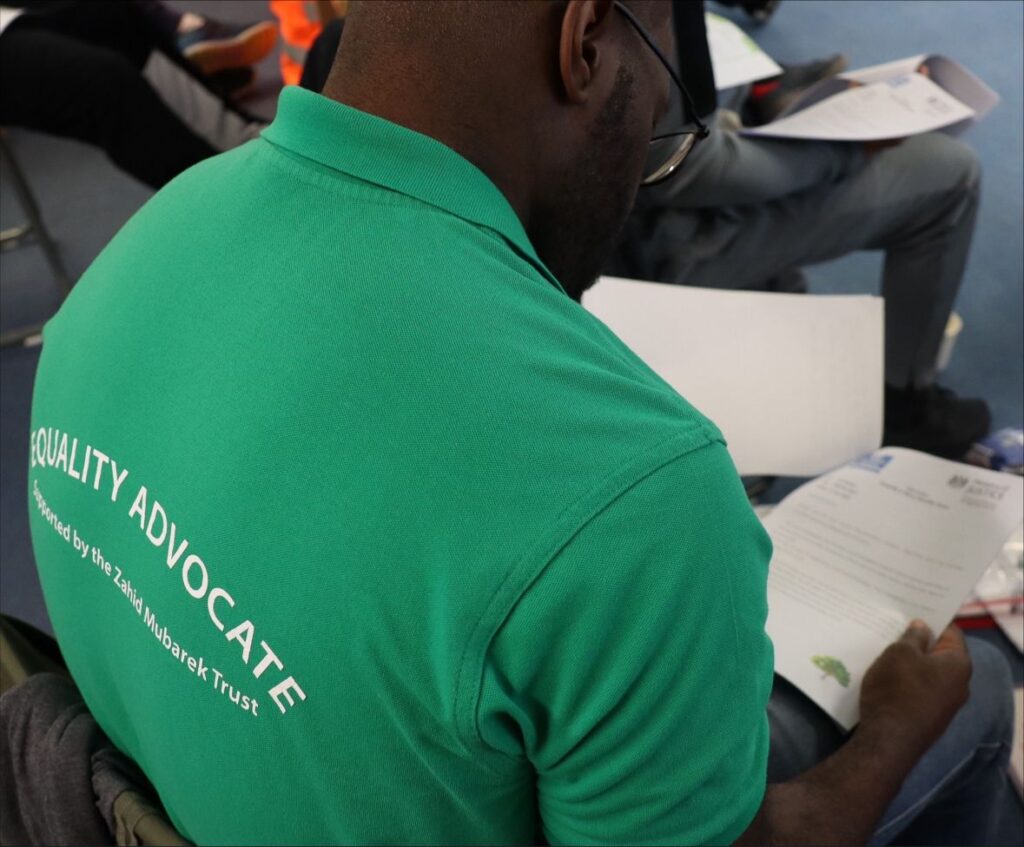
“We’re not trying to blur lines; we’re trying to bring about positive change.”
In the heart of a challenging environment, prisoners at HMP Wayland discovered a powerful tool for change: their own voices.
– Shakeil Hemmings, Regional Lead at the Zahid Mubarek Trust
The ZMT’s proactive response to the lack of trust in the discrimination complaints process among ethnic minority and young prisoners was to establish a peer-led scrutiny panel in HMP Wayland as part of a pilot project. The pilot was infused with ambition, hope, and expectations that have been fed by many years’ worth of evidence on the profound benefits of prisoner participation.
The panel, composed of trained prisoner equality advocates, was tasked with reviewing discrimination complaints submitted by prisoners at HMP Wayland. By providing an independent and peer-led perspective, the panel aimed to build confidence in the complaints process and ensure that all complaints were thoroughly investigated and addressed.
In many cases, the panel was in agreement that complaints were handled fairly. However, there were instances where the panel identified additional issues or recommended more robust corrective action. The panel’s recommendations were presented to prison management, who were proactive in responding to the panels feedback.
The pilot demonstrated the value of peer-led scrutiny in improving the effectiveness and fairness of the discrimination complaints process. By providing an independent and trusted perspective, the panel was able to identify potential shortcomings in the existing process, and advocate for improvements.
Active Citizenship at the Heart of Change
The HMP Wayland pilot was an innovative initiative that challenged the traditional top-down approach to prison governance. By empowering prisoners to take the lead in scrutinising complaints, the pilot demonstrated the importance of centring the experiences and perspectives of those who are directly impacted by the process. We asked the question, who best to cast assertions on the functioning of a rights protecting mechanism, then those the mechanism is intended to protect?
The pilot was not just about identifying problems; it was about empowering prisoners to have a stake in the operation of a rights protecting mechanism, to be a part of the solution. By training and supporting prisoners to serve on the scrutiny panel, the ZMT fostered a culture of active citizenship within the prison.
By giving them a voice and a platform, the ZMT & HMP Wayland showed that prisoners should not be underestimated, they are more than their past mistakes. They’re advocates, capable of driving real, meaningful change.
The HMP Wayland pilot proved that peer-led scrutiny is a powerful tool in ensuring justice is truly served. Ultimately, the HMP Wayland pilot was a testament to the power of trust, accountability, and transparency – the keys to fostering a more equitable and just prison environment. By empowering prisoners to play an active role in oversight, the ZMT demonstrated that a collaborative approach can lead to significant improvements in the treatment of prisoners and the overall effectiveness of prison custody.
A Catalyst for Change:
The HMP Wayland pilot was more than just a pilot, it was a catalyst for change within the prison complaints process. By placing prisoners at the forefront of the scrutiny process, the ZMT demonstrated the power of peer-led oversight and the importance of centring the experiences of those who are directly impacted by the complaints process.
The pilot’s success can be attributed to multiple factors, including:
- Empowerment of prisoners and fostering a sense of agency
- Improved accountability, transparency, trust, and performance of the management of equality and complaints in prison custody.
- Enhanced trust between prisoners, staff and the wider prison community
- Positive ripple effects – a broader impact on relationships, improved record keeping, and developing a learning culture within the prison
The HMP Wayland pilot serves as a model for other prisons seeking to improve the treatment of prisoners and create a more equitable and just environment. By following the ZMT’s example, prisons can harness the power of peer-led oversight to drive positive change and ensure that the rights of prisoners are protected, and that the concerns, needs, and voices of prisoners are heard.
